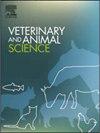Thermal manipulation and rosemary extract: Their combined effects on embryonic development, hatchability, and physiological responses of hatched chicks
IF 1.9
Q2 AGRICULTURE, DAIRY & ANIMAL SCIENCE
引用次数: 0
Abstract
This study explored the impact of rosemary extract and ascorbic acid sprays on eggs incubated at high temperatures, focusing on embryonic development, hatchability, and chick physiology. A total of 1,200 eggs were divided into four treatment groups: distilled water, rosemary extract, ascorbic acid, and no spray, under normal and heat stress conditions. Ascorbic acid under heat stress reduced embryo length by day 18. Using 30 g/L ascorbic acid increased egg weight, decreased water loss, reduced embryonic weight, and altered yolk sac to embryo weight ratio (P < 0.05). It also extended incubation time and increased embryonic mortality by day 21, negatively affecting hatchability (P < 0.05). Heat stress raised yolk sac weight and lowered cloacal temperature in chicks. Ascorbic acid increased yolk sac weight but resulted in shorter chicks at hatch. Rosemary extract and distilled water under heat stress increased red blood cell counts, while distilled water at normal temperatures had the highest hematocrit percentage (P < 0.05). Untreated eggs showed higher white blood cell counts and heterophil-to-lymphocyte ratios in chicks. Within 40 h post-hatch, ascorbic acid reduced chick weight but increased yolk sac metrics. Rosemary extract decreased cloacal and body surface temperatures (P < 0.05). By week's end, ascorbic acid reduced chick length, while heat stress improved chick weights and feed conversion ratios during broiler rearing (P < 0.05). In conclusion, rosemary extract and ascorbic acid significantly influence embryonic development and physiological responses. Ascorbic acid notably reduced hatchability and increased embryonic mortality under heat stress, highlighting its critical effects.
热操作和迷迭香提取物对小鸡胚胎发育、孵化率和生理反应的综合影响
本研究探讨了迷迭香提取物和抗坏血酸喷雾对高温孵育鸡蛋的影响,重点研究了胚胎发育、孵化率和小鸡生理。在正常和热应激条件下,总共1200个鸡蛋被分为四个处理组:蒸馏水、迷迭香提取物、抗坏血酸和无喷雾。热应激下抗坏血酸使第18天的胚胎长度缩短。30 g/L抗坏血酸增加了蛋重,减少了失水,降低了胚重,改变了卵黄囊与胚重比(P <;0.05)。延长了孵育时间,增加了第21天的胚胎死亡率,对孵化率产生了不利影响(P <;0.05)。热应激提高了雏鸡卵黄囊重量,降低了粪腔温度。抗坏血酸增加了卵黄囊重量,但导致雏鸡在孵化时变矮。热应激下的迷迭香提取物和蒸馏水使红细胞计数增加,而常温下蒸馏水的红细胞比容百分比最高(P <;0.05)。未经处理的鸡蛋显示出较高的白细胞计数和异白细胞/淋巴细胞比率。在孵化后40 h内,抗坏血酸降低了雏鸡体重,但增加了卵黄囊指标。迷迭香提取物可降低肺泡和体表温度(P <;0.05)。到周末,抗坏血酸降低了肉鸡的体长,而热应激提高了肉鸡的体重和饲料系数(P <;0.05)。综上所述,迷迭香提取物和抗坏血酸显著影响胚胎发育和生理反应。抗坏血酸显著降低了热应激下的胚胎孵化率和增加了胚胎死亡率,突出了其关键作用。
本文章由计算机程序翻译,如有差异,请以英文原文为准。
求助全文
约1分钟内获得全文
求助全文
来源期刊

Veterinary and Animal Science
Veterinary-Veterinary (all)
CiteScore
3.50
自引率
0.00%
发文量
43
审稿时长
47 days
 求助内容:
求助内容: 应助结果提醒方式:
应助结果提醒方式:


